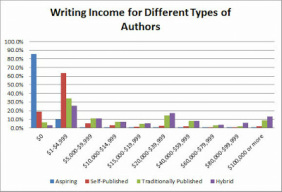
You can either read her article and weep, or, like a sensible person, you can decide to cover all your bets. Keep your day job, self-publish, AND hound agents until one of them takes pity on you and sells your manuscript to Random/Penguin.
____________________________
The Self-Publishing Debate: A Social Scientist Separates Fact from Fiction (Part 3 of 3)
By Dana Beth Weinberg
Not surprisingly, most aspiring authors in the sample reported no annual income from their writing. About 19% of self-published authors in the sample also reported no annual income from their writing, compared to 6% of traditionally published authors and only 3% of hybrid authors. While most of the survey respondents clustered at the lower end of the income distribution, some authors did report earning $200,000 or more from their writing, the highest income choice on the survey: less than one percent (0.6%) of self-published authors, 4.5% of traditionally published authors, and 6.7% of hybrid authors who reported on their income. (In the chart, I have collapsed the top categories to $100,000 or more for better visibility. These aggregated category represents 1.8% of self-published authors, 8.8% of traditionally published authors, and 13.2% of hybrid authors.)
Self-published authors in the sample earned a median income in the range of $1 to $4,999, while traditionally published authors had a median writing income of $5,000 to $9,999, and hybrid authors earned a median income of $15,000 to $19,999. Comparing authors with the same number of manuscripts (analysis not shown), there is a strong similarity in income between hybrid and traditional authors, but hybrid authors outperformed their self-published counterparts on earnings.
Read the full article HERE. I insist.
 RSS Feed
RSS Feed